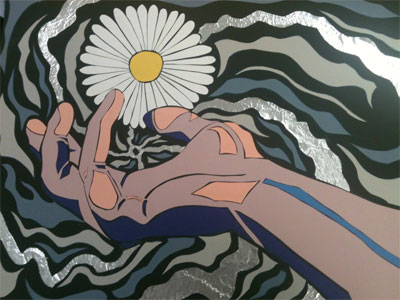All Nonfiction
- Bullying
- Books
- Academic
- Author Interviews
- Celebrity interviews
- College Articles
- College Essays
- Educator of the Year
- Heroes
- Interviews
- Memoir
- Personal Experience
- Sports
- Travel & Culture
All Opinions
- Bullying
- Current Events / Politics
- Discrimination
- Drugs / Alcohol / Smoking
- Entertainment / Celebrities
- Environment
- Love / Relationships
- Movies / Music / TV
- Pop Culture / Trends
- School / College
- Social Issues / Civics
- Spirituality / Religion
- Sports / Hobbies
All Hot Topics
- Bullying
- Community Service
- Environment
- Health
- Letters to the Editor
- Pride & Prejudice
- What Matters
- Back
Summer Guide
- Program Links
- Program Reviews
- Back
College Guide
- College Links
- College Reviews
- College Essays
- College Articles
- Back
No Longer an Artist
Adjacent to the staircase is a windowsill, large enough to accommodate for a clay jar, a houseplant, and a portrait of my mother that I painted when I was five.
We went to the Picasso museum many summers ago. I learned a great deal of Picasso quotations there, but only one stuck with me: ‘every child is an artist- the problem is how to remain an artist once they grow up’.
I find Picasso hard to believe whenever I see my sister paint a brown circle and call it a bear, but I can’t deny that there is some sort of charm to her careless lines and thoughtless command of colour- the same charm, inimitable by even Picasso himself, that floats somewhere within the garish reds and yellows of my mother’s portrait. Two wobbly brown lines, coagulating at the edges, tapered in to indicate a sharp jaw. The same brown defined her hooded eyes, her slight smile, and separated each tress of yellow hair from the red background. There are unfilled gaps in each line- after all, it was a large canvas, and I had small hands. In fact, there are unfilled gaps all over the piece. I didn’t really notice them, nor care, ten years ago.
Ten years later, I became a GCSE art student. My sketchbooks’ pages are saturated with delicate lines, ghosts of stray edges cleaned up with an eraser, and seas of black, white, and grey. My favourite medium was acrylic when I was younger- pots of acrylic light up against a white studio like neon signs- but by fifteen, I found myself repelled by them. The brighter, the more capricious. I stuck to black-and-white, mostly pencil, until my art teacher ran through the assessment objectives and concluded that it’d be beneficial for me to show more range. So I added colour.
Additionally, I filled in the blank spaces in the background that I was supposed to fill. My backgrounds were usually black, so it was easy to let a pinprick of white paper peek through. I’d turn on my phone, and zoom in on baroque paintings to see which way the brushstrokes ran- one of the assessment objectives is centred around working in the style of other artists. I never really understood why that objective was labelled ‘development’. Of course, that was none of my concern. My only concern was how far I was from a 9.
My classroom felt like a paint-splattered cavern where that concern echoed without end. My own ambitions and anxieties criss-crossed through me, trapping me in some sort of grid where I can’t even move my head, never mind my legs. I can look ahead, but all I’d see is the distance between me and some other aim. Nowadays, with university and adulthood looming around the corner, I can feel the grid tightening.
Every day, I pass by the portrait of my mother, and wonder whether it’s a monument, or a grave, to a time where I could move.

Similar Articles
JOIN THE DISCUSSION
This article has 0 comments.

I wrote this short piece during quarantine. I used to do art for fun, but recently, I've lost my passion for it. In this text, I am trying to deconstruct what happened.